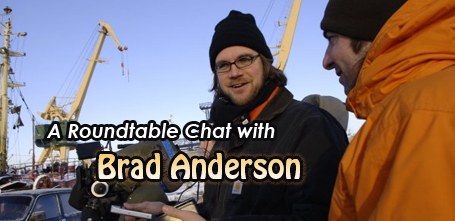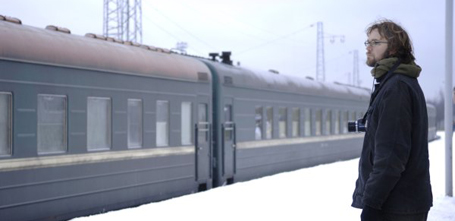 With the temperature dropping, it's time to find someone to keep you warm. Find your hookups with our online dating guide!
With the temperature dropping, it's time to find someone to keep you warm. Find your hookups with our online dating guide!

Interview date: 06/26/2008
Run date: 07/25/2008
Movies Home / Entertainment Channel / Bullz-Eye Home
Soon after college, director Brad Anderson ("Next Stop Wonderland," "The Machinist") traveled the fabled Trans-Siberian Railway, thinking to himself that the stuffy, smoke-filled train corridors and sleeping cars would provide an ideal setting for a film. Twenty years later comes "Transsiberian," an indie thriller that poses more questions than answers. The film about murder, paranoia, secrets and survival – and lots and lots of snow – stars Emily Mortimer, Woody Harrelson and Ben Kingsley. Bullz-Eye sat in on a recent roundtable with Anderson.
Bullz-Eye: This film was inspired by a Transsiberian trip that you took years ago. Is that right?
Brad Anderson: I took the train after I graduated from college; I did my backpacking tour of Asia.
BE: After the fall of the Soviet Union or before?
BA: I hate to say it, but this was 1988, just prior to the fall of the Soviet Union, during the whole Glasnost era. But I had studied Russian in college and was interested in going. But I started out backing through India and China, and ended up in Beijing, like our couple in the movie does, and took the Transsiberian, across Russia to Moscow, practicing my Russian on the train and stuff like that. So that was a very informative experience for me. You know, you’re young and you’re excited to be traveling. I met a lot of interesting characters. And it has kind of been stewing in my brain since then that this trip, this journey, would be a great setting for some kind of story. You know? So 20-odd years later, Will Conroy, who is sitting back there humbly… (Motions behind him) …he’s the co-writer of the movie. He and I got together and came up with the initial premise, but the texture and the atmosphere of the story come from my own experience. The story, the plot and all that, we did together.
BE: Don’t you think that this setting…the freezing cold tundra of Russia, the cramped train…was particularly ideal for a story about moral ambiguity?
BA: Sure. And part of it was, if you are trying to get away with murder, as Jessie’s character is trying to do, what better place to hide a body than Siberia? You know, who’s going to look under the snow? It’s the most remote, out-of-the-way place on the planet. So that kind of became conditional, as far as coming up with the plot. The story could not have happened if they were taking the METRO from Boston to Washington, DC, so it had to be kind of an exotic, remote kind of train, like this one is. And in coming up with devices in order to up the stakes and amplify the level of paranoia, what better location to do that than a claustrophobic train that is moving non-stop across the tundra? You know, there’s no place for her to escape, to hide. Even if she gets off the train, she’s got nowhere to go. It created something where we could boost the level of paranoia in the story by putting it on a train, as opposed to if it was on a cruise ship, where there are lots of places you can hide. This train is like being on a submarine: nowhere to go.
BE: Totally.
BA: So the physical constraints of the train, I think, work in conjunction with our plot. Plus, just Russia itself…not so much now, but when we were writing the script; Russia is changing so quickly…but the level of corruption and destitution, particularly in the Russian Far East, was pretty drastic, and gave us an ability to create these characters like Gringko, who’s a corrupt cop, and like the other bad guys. In fact, it’s really not all that different now. Maybe in Moscow and St. Petersburg, but in the Russian Far East, it really hasn’t changed as much. There’s the oil boom, but the villages and town along that train route aren’t all that different than when I took that train back in 1988. And we took it just before we started shooting the movie, and I was impressed that the physical train cars had not changed in 20 years. The same Czech-built train cars, same muddy floors, worn down seat cushion, same smell…you could still smoke on the train…so it was interesting that it had not changed at all, which was in some weird way encouraging, because we knew that, when we made the movie, we wouldn’t have to set it on some modern bullet train.
BE: It did not look luxurious.
BA: It was not luxurious. And still isn’t.

Reporter: Can you talk about your attraction to the horror-thriller genre? You started out with romantic comedies, and then into horror-thrillers with “The Machinist.”
BA: Well the next one, I’m hoping, will be kind of a 180, back to a romantic comedy…a musical, really. Totally different than what I just did. But the past three films I’ve done, I guess I’d describe them more as paranoid thrillers, because they’re not action thrillers, they are more in the mind, about characters who are discovering something about themselves. I don’t know what my attraction to it is… just that I find those kinds of characters and stories just very cinematic, very appealing, as a filmmaker. And creating a mood and creating a tone in a story to me is as important as making sure the plot works and that characters work well together. The tone and the atmosphere is always something that as a filmmaker…you have so many tools to do that, just the editing, the music, the look of the film, the design. In “The Machinist” and in “Session Nine,” they were so much about creating just a level of menace, a level of dread, that as a filmmaker it’s a lot of fun doing that. It can be fun doing a romantic comedy, too, to create a level of sweetness and melancholy and that type of stuff. And Will and I, when we were writing it, wanted to deal with not just the plot mechanics, but also making it feel like you were really on this train. Like, you could smell the alcohol on people’s breath, you can feel the dust in the air…just giving it a real kind of rawness and exoticism, in terms of the atmosphere. I mean, just the sound of the train. I can’t tell you how much time we spent perfecting the squeak of the wheels, or “what does it sound like when you’re in this cabin versus when you are in this corridor.” I just love that kind of stuff. It’s, like, fun. That’s when filmmaking begins to feel like you’re a kid in a candy store. You’re pulling on all these things. It’s a blast.
R: What would be the main message that the public can get from this movie? The idea that you are sending to them?
BA: Um. Don’t take the Transsiberian…?
BE: Always fly!
BA: Yeah right, fly! Aeroflot! (Laughs) I don’t know, I really don’t think in terms of “messages.” It’s not a message movie, you know? Maybe “you can’t escape your lies” or “you can’t run from the truth”… but those are platitudes and they’re not that interesting.
BE: And they’re not true. Of course you can run from the truth.
BA: (Laughs) I know, right? Our own president has been doing it for eight years. I don’t know if the message is anything other than “think about it.” I want to make movies that make people argue as they leave. “Why did she do that? Why didn’t she just tell her husband what she did?” You want to create a level of intrigue in a film, so by the time the audience leaves the film, they are intrigued, and want to discuss it. Some will have an opinion one way and some will have another. In some ways used Woody Harrelson’s character – the naïve Midwestern farmer – he’s kind of our stand-in for that “everything is black and white, there are clear moral distinctions between right and wrong,” you know? In some way we did think about that George Bush, all-American, you’re with us or you’re against us mentality. “They’re the evildoers and we were the righteous ones.”
BE: And I’m “the decider” of which is which.
BA: (Laughs) Yeah, right. So that’s what we were thinking about. And we wanted Woody as this very self-effacing, very steady guy who, in some ways, becomes the hero in the end. But even he, by the end of it, in some perverse way knows that there’s something up, that Jessie’s not telling him the full truth. But he’d rather live with not having that knowledge and keeping her. So that moment at the end on that plane is kind of like that moment at the end of “The Graduate,” and they’re on the bus and it’s all good. But what do we do now? Whereas I guess if it was a Hollywood movie, it would end with heroics…or it would end with the two of them and a newborn child, as Woody lifts the child. (Laughs)
BE: And Gringko marches off in handcuffs.
BA: Right, right! I don’t know. Those straightforward clichés just weren’t as interesting to us.
R: Can you talk about Emily Mortimer coming in so last minute to play Jessie?
BA: Well, Emily was always in the top three or so actresses that we were considering. So it wasn’t really a hard choice to say, when Samantha (Morton) had an accident, let’s go to Emily straight away. I think she…I don’t know what she told you, the myth is like: we sent her a script in the morning, she read it on a plane that afternoon, and, boom, she’s in Lithuania for two months. But she jumped into the gauntlet. She had no preparation whatsoever. I have to commend her for her courage in just jumping right in. In the end, it was one of those things that you don’t know at the time – and you never really know – but I was immediately drawn in when she started doing her thing. Because she gives the character – even thought she’s conflicted – a level of empathy, even though she’s making really bad choices. You kind of understand what she’s trying to do. She’s trying to salvage something in her life that has value. Even though she’s made a big error, you sympathize with her plight to a degree, and you also try to put yourself in her shoes. Like, what would you do? But she’s one of those actresses who have no vanity whatsoever. And she’s gung-ho. She’s totally gung-ho.
BE: Returning briefly to the idea of morality and shades of gray, there’s a line by Gringko, when he’s talking to Jessie, and he’s comparing the pre- and post-Soviet era, where he’s like – and I’m paraphrasing – “before you could live in the darkness, and now you can die in the light. Which is better?” And that seems very much in line with the whole complex moral argument that swirls around the film.
BA: Yeah.
BE: And it seems to not just be a reference to the Soviet Union, but also about truth-telling. You know, you can die in the light – of honesty.
BA: I think setting it in Russia gave us the ability to have those kinds of nuances about truth and deception. There’s that point on the train when they’re all talking to the local Russians about Siberia, and the history of that place, where you could just send hundreds of thousands of prisoners to just get swallowed up in the Gulag, never to be heard from again, covered up with snow, you know? It’s a place where entire villages can disappear. Traditionally in Russia, it was the kind of place where, if you had a dirty secret, political prisoners or whatever, you’d send them to Siberia. So in some ways Siberia is a place where you go to be removed from the world. A place you go to disappear, you know? So the idea of this train – this little tube, or village – moving through this empty wasteland seemed symbolic in this movie. It needed to have the dark brooding history of Russia. It made sense to have this story placed in a culture that has very much been about deception and covering up lies. And Gringko says that.
You can follow us on Twitter and Facebook for content updates. Also, sign up for our email list for weekly updates and check us out on Google+ as well.










